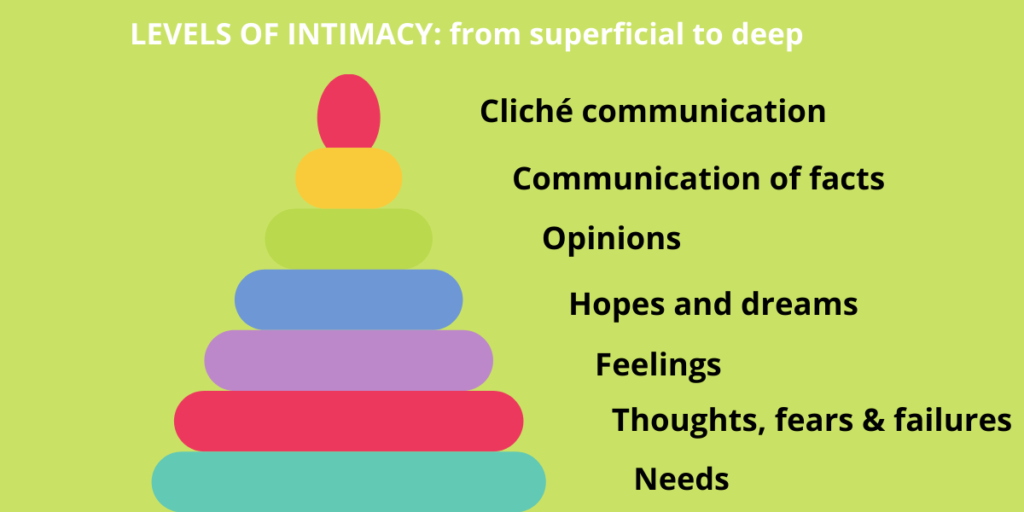Let’s face it: intimacy feels good. You miss intimacy. But at the same time, you don’t want to be that close to a person.
If you have been through a breakup of a long-term relationship you know it hurts. It hurts to be that close to a person, it hurts to be without a close person.
Some people go through "n" marriages – they just don’t give up on a relationship. They don’t chicken out, they go with everything they have.. and let’s do this again. I like to think of them as brave.
Other people are more self-protective and even if they get involved in a relationship: they don’t keep it close… They’re not alone, but if they think it through: it feels lonely at times. Just doesn’t look lonely. But feels lonely at times. They sure know they don’t have it all: but it’s better than nothing at all. At least they have someone to watch over them.
And there are other people, the more radical, normally introspective kind of people: all or nothing at all. If they feel there’s no intimate connection: then there’s no relationship.
Are you with me up to this point? Then you understand what I’m talking about.
1. What Is Intimacy? Types Of Intimacy
Of course, when we talk about intimacy we tend to think about romantic relationships. But there can be intimacy in friendship, parenthood, or siblinghood.
If you're missing intimacy maybe you should focus, not only on one form of relationship (the romantic one) but make sure to develop intimacy in the other forms of relationship (friends or family). To keep some personal balance.
There are many 4 main types of intimacy:

1.1. Experiential Intimacy: when people bond and have their actions synchronized in teamwork.
Example: Argentine Tango partners who are very unison when they dance together.
1.2. Emotional Intimacy: when people show openness because they feel safe to share their feelings with each other, even if those feelings are uncomfortable.
Example: A woman confides to a close friend her discomfort with a personal issue. She trusts her friend to offer her comfort, instead of using her insecurities against her.
1.3. Intellectual Intimacy: when there is this comfort in sharing ideas and opinions with another person, even if they are different or disagreeable points of view.
Example: the people involved don’t feel the need to “win” a conversation, they just enjoy debating and exchange each other's opinions
1.4. Sexual Intimacy: when people are sexually involved.
Example: when sexual partners know each other preferences to be stimulated. Sexual intimacy can be deceiving and leads to feelings of emptiness, if exist by itself. It's better and more consistent in long-term relationships when emotional intimacy is present too.
There's a 5th kind of intimacy for which there’s no known name, for it’s more related to intuition (the 6th sense) between two people strongly bonded.
Example: a mother very close to her child that senses when he/she needs help or a couple with very straight emotional ties that are very sensitive to each other’s needs/feelings, may they be physically closer or not.
2. Fast Food. Fast internet. Fast Friends. Weak Intimacy.
One thing is for sure: intimacy demands for trust.
How else can you show and share your insides, unless there’s a nest of trust?
That’s what intimacy is about, whether they might be emotional or intellectual, a trust that the other part won’t use against you , with whatever information you might share with them.
Can be challenging. Develop intimate sharing through a computer or a telephone.
As a good home-cooking meal take its time, so does intimacy.
Is challenging to have intimacy, on a fast-food-base-line.
Internet social media propels short answers. Fast talk, fast friends, weak intimacy.
That does not create a propitious environment to develop solid intimacy connection based.
Besides: you as a person communicate through all five (six?) senses.
Is very limited to function only with two of your senses – eyes and ears - and upgrade for a more deep level of intimacy, of share.
3. Levels Of Intimacy
Intimacy is all about communication: superficial or deep.
There are many levels of intimacy in a relationship: try to identify where you are, what’s your communication basis, in your relationship, if you have one.

The basic level is the cliché communication or safe communication, where you share none or very little intimacy.
The deepest level of intimacy is when you are able to communicate more intimate things like your deepest needs, emotions, and desires.
Yep: you really show your inner side. You really show up the core of your inner self.
That demands a great amount of mutual trust. And when you get to that point of openness is because you no longer fear rejection: you trust that you are accepted the way you are.
If you want to deepen the concept of levels/stages of intimacy then take a look at this link: https://www.thehartcentre.com.au/the-5-levels-of-intimacy-which-level-do-you-communicate-on/
4. What It Takes To Have (Intimacy)
Well: that’s another challenge. Probably small steps, it all depends on the level of trust you have on the other part, how easy it is to communicate.
But if you want to have people to trust, you have to develop a corresponding amount of trustworthiness: you have to develop yourself to be a trustworthy person.
Like I’ve heard in Joe Dispenza’s video “The Magical Formula To Attract Love”, bring your best to a relationship and become the person you want to attract into your life. It's probably the best way to have an intimate relationship if that's what you want.
Here are the key factors to develop an intimate relationship:
Mutual Acceptance: for who you really are, for what that other person really is. Not for what appears to be. And we go back to the trust subject. But they walk hand in hand: trust and acceptance. Show you are worth the trust. Make the right questions. Be really interested in the other person. Treat what you learn like treasure.
Honesty (subject treated on a previous blog): how can you have acceptance if there’s no honesty? Honesty and intimacy literally feed each other.
Compassion: nobody is perfect. Nobody. So if you want to have an intimate relationship, compassion is needed for each individuals' flaws.
Affection: that’s a primary need. You want to give, you want o to receive. After all, no one wants to be intimate with a narcissistic psychopath, that has no affection for anyone… right? Hope so…
Communication: intimacy is all about communication. And if we’re talking about a love relationship, the better you communicate in those 4 types of intimacy, mentioned before - experiential, emotional, intellectual, and sexual, the better it is. You got to have the whole bucket.
INTIMISS REGARDS
References:
https://www.goodtherapy.org/blog/psychpedia/intimacy
https://www.thehartcentre.com.au/the-5-levels-of-intimacy-which-level-do-you-communicate-on/
